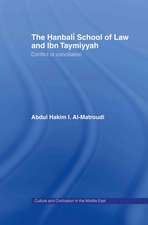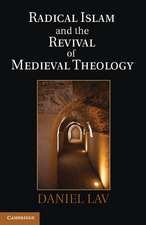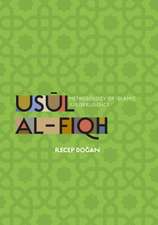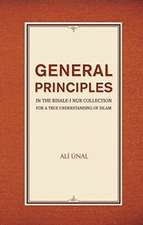Moral Rationalism and Shari'a: Independent rationality in modern Shi'i usul al-Fiqh: Culture and Civilization in the Middle East
Autor Ali-Reza Bhojanien Limba Engleză Hardback – 27 mar 2015
Within Shī'ī works of Sharī 'a legal theory (usūl al-fiqh) there is a theoretical space for reason as an independent source of normativity alongside the Qur’ān and the Prophetic tradition. The position holds that humans are capable of understanding moral values independently of revelation. Describing themselves as 'Adliyya (literally the people of Justice), this allows the Shī 'a, who describe themselves as 'Adiliyya (literally, the People of Justice), to attribute a substantive rational conception of justice to God, both in terms of His actions and His regulative instructions. Despite the Shī'ī adoption of this moral rationalism, independent judgments of rational morality play little or no role in the actual inference of Sharī 'a norms within mainstream contemporary Shī'ī thought.
Through a close examination of the notion of independent rationality as a source in modern Shī'ī usūl al-fiqh, the obstacles preventing this moral rationalism from impacting the understanding of Sharī 'a are shown to be purely epistemic. In line with the ‘emic’ (insider) approach adopted, these epistemic obstacles are revisited identifying the scope for allowing a reading of Sharī'a that is consistent with the fundamental moral rationalism of Shī'ī thought. It is argued that judgments of rational morality, even when not definitively certain, cannot be ignored in the face of the apparent meaning of texts that are themselves also not certain. An 'Adliyya reading of Sharī'a demands that the strength of independent rational evidence be reconciled against the strength of any other apparently conflicting evidence, such that independent judgments of rational morality act as a condition for the validity of precepts attributed to a just and moral God.
| Toate formatele și edițiile | Preț | Express |
|---|---|---|
| Paperback (1) | 326.49 lei 3-5 săpt. | +22.67 lei 7-13 zile |
| Taylor & Francis – 12 dec 2019 | 326.49 lei 3-5 săpt. | +22.67 lei 7-13 zile |
| Hardback (1) | 1108.42 lei 6-8 săpt. | |
| Taylor & Francis – 27 mar 2015 | 1108.42 lei 6-8 săpt. |
Din seria Culture and Civilization in the Middle East
- 9%
 Preț: 1004.73 lei
Preț: 1004.73 lei -
 Preț: 310.41 lei
Preț: 310.41 lei -
 Preț: 326.49 lei
Preț: 326.49 lei -
 Preț: 415.67 lei
Preț: 415.67 lei - 18%
 Preț: 1057.89 lei
Preț: 1057.89 lei - 18%
 Preț: 1165.97 lei
Preț: 1165.97 lei - 18%
 Preț: 1168.76 lei
Preț: 1168.76 lei -
 Preț: 484.04 lei
Preț: 484.04 lei - 18%
 Preț: 1057.75 lei
Preț: 1057.75 lei - 18%
 Preț: 1068.18 lei
Preț: 1068.18 lei - 18%
 Preț: 1191.57 lei
Preț: 1191.57 lei -
 Preț: 413.13 lei
Preț: 413.13 lei - 8%
 Preț: 382.66 lei
Preț: 382.66 lei - 16%
 Preț: 272.83 lei
Preț: 272.83 lei -
 Preț: 488.51 lei
Preț: 488.51 lei -
 Preț: 418.22 lei
Preț: 418.22 lei - 26%
 Preț: 819.48 lei
Preț: 819.48 lei - 18%
 Preț: 1119.45 lei
Preț: 1119.45 lei - 18%
 Preț: 1113.60 lei
Preț: 1113.60 lei -
 Preț: 451.32 lei
Preț: 451.32 lei - 18%
 Preț: 1058.69 lei
Preț: 1058.69 lei - 15%
 Preț: 421.62 lei
Preț: 421.62 lei - 18%
 Preț: 1056.32 lei
Preț: 1056.32 lei - 18%
 Preț: 1060.87 lei
Preț: 1060.87 lei - 18%
 Preț: 1057.40 lei
Preț: 1057.40 lei - 26%
 Preț: 822.01 lei
Preț: 822.01 lei -
 Preț: 491.98 lei
Preț: 491.98 lei - 18%
 Preț: 1058.79 lei
Preț: 1058.79 lei - 18%
 Preț: 1049.19 lei
Preț: 1049.19 lei - 18%
 Preț: 998.71 lei
Preț: 998.71 lei - 18%
 Preț: 1098.11 lei
Preț: 1098.11 lei -
 Preț: 496.35 lei
Preț: 496.35 lei - 18%
 Preț: 1121.60 lei
Preț: 1121.60 lei - 18%
 Preț: 1055.32 lei
Preț: 1055.32 lei - 18%
 Preț: 1168.06 lei
Preț: 1168.06 lei - 18%
 Preț: 1168.76 lei
Preț: 1168.76 lei - 18%
 Preț: 1053.16 lei
Preț: 1053.16 lei - 18%
 Preț: 1224.24 lei
Preț: 1224.24 lei -
 Preț: 484.47 lei
Preț: 484.47 lei - 18%
 Preț: 1062.16 lei
Preț: 1062.16 lei - 26%
 Preț: 821.10 lei
Preț: 821.10 lei - 22%
 Preț: 312.77 lei
Preț: 312.77 lei - 31%
 Preț: 763.78 lei
Preț: 763.78 lei
Preț: 1108.42 lei
Preț vechi: 1351.73 lei
-18% Nou
Puncte Express: 1663
Preț estimativ în valută:
212.10€ • 221.90$ • 176.19£
212.10€ • 221.90$ • 176.19£
Carte tipărită la comandă
Livrare economică 02-16 aprilie
Preluare comenzi: 021 569.72.76
Specificații
ISBN-13: 9781138800267
ISBN-10: 1138800260
Pagini: 194
Ilustrații: 3 black & white illustrations, 3 black & white line drawings
Dimensiuni: 156 x 234 x 15 mm
Greutate: 0.43 kg
Ediția:1
Editura: Taylor & Francis
Colecția Routledge
Seria Culture and Civilization in the Middle East
Locul publicării:Oxford, United Kingdom
ISBN-10: 1138800260
Pagini: 194
Ilustrații: 3 black & white illustrations, 3 black & white line drawings
Dimensiuni: 156 x 234 x 15 mm
Greutate: 0.43 kg
Ediția:1
Editura: Taylor & Francis
Colecția Routledge
Seria Culture and Civilization in the Middle East
Locul publicării:Oxford, United Kingdom
Public țintă
Postgraduate and UndergraduateCuprins
Introduction 1 Reason as a source of Sharī 'a in Shī 'ī usūl al-fiqh 2 The intelligibility of moral values in Shī 'ī theological thought 3 The nature of morality, rationality and independent judgments of rational morality in modern Shī 'ī usūl al-fiqh 4 The nature of morality, rationality and independent judgments of rational morality in modern Shī 'ī usūl al-fiqh 5 Reassessing the obstacles to independent judgments of rational morality impacting the reading of Sharī 'a
Notă biografică
Ali-Reza Bhojani is a Post-Doctoral Fellow at the Al-Mahdi Institute, Birmingham. His research interests include Islamic legal theory, Muslim theology and ethics, Shī'ī studies and the Muslim religious responses to modernity.
Descriere
Moral rationalism and Shari’a is the first attempt at outlining the scope for a theological reading of Sharī 'a, based on a critical examination of why the 'Adliyya theological ethics hasn’t significantly impacted Shī'ī readings of Shari’a and how these resources may come to do so.














